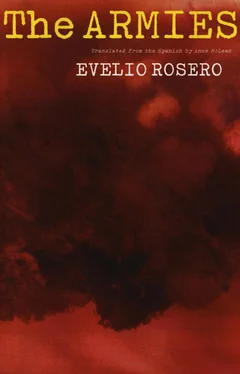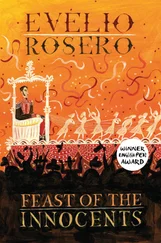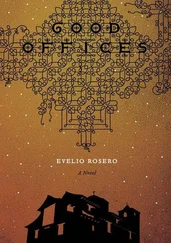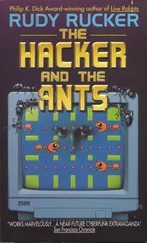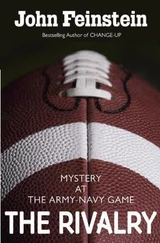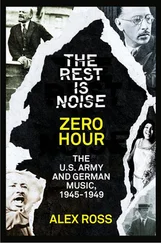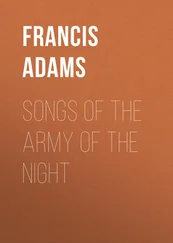The doctor offers her a sedative, someone brings a glass of water. She ignores the pill, the water. Her sleepless eyes look at me unseeing.
“Then I couldn’t move,” she says. “I stayed still until dawn. I heard you go out, I heard your door, but I could not manage to scream. By the time I was able to walk the sun was already up, it was the first day of my life without my son. Then I wished the earth would swallow me up, do you understand?”
Again the doctor offers her the pill, the water, and she obeys without taking her eyes from mine, and she has her unseeing eyes fixed on me still as I walk to the door.
I do not find Otilia at home. I am in the garden, which is unchanged, as if nothing had happened, although everything has happened: I see the ladder there, leaning against the wall; in the fountain the flashing orange fish swim; one of the cats stretching in the sun looks at me, makes me think of Geraldina’s eyes, Geraldina dressed in black overnight.
“Profesor,” a voice shouts from the door, which I have left open.
In the doorway waits Sultana, with her daughter, the girl who was looking after Mauricio Rey on his sick day. As if Rey had sent her to me. But it is nothing to do with Mauricio Rey: it is my own wife, I find out, who has arranged with Sultana for her daughter to come and help once a week in the orchard.
“We met your wife at the corner,” Sultana explains. “She told me she was going to ask about you at the presbytery. You’ll have to go and find her; this is no day to be wandering the streets.”
I listen to Sultana, but I see only the girl: she no longer has messy hair, or the same look in her eyes; now she is just an impatient child, or maybe bored at the thought of work.
“It won’t be much,” I encourage her. “You just have to finish picking the oranges and then you can go home.”
Otilia has brought me temptation in person, and she does not even know it. The girl is wearing a simple dress and goes barefoot, but she does not shine now, she drifts down the corridor in little hops, peeks through the kitchen door, timidly looks at the two bedrooms, the living room, she fidgets, vulnerable and scrawny, like a little bird. She does not look like her mother: Sultana is large, big-boned, strong; she is wearing her eternal, incandescent red baseball cap; her prominent belly does not diminish her strength: she cleans the church, the police station, the town hall all on her own, washes and irons clothes, makes her living that way and wants her daughter to do the same.
“See that, Cristina?” she asks. “You’ll come here once a week, it’s easy to find.”
They carry on out into the garden. The agitation, the shock of seeing this girl walking, of pursuing and perusing this girl, perceiving the fatality of the wild aroma, raw but sharp, that each of her steps gives off, makes you forget what is most important to you in the world, Ismael. I shall speak to her, sooner or later I shall make her laugh, tell her a tale and, while she is up the ladder, I shall surely pick flowers nearby.
“I’ve never seen your garden,” Sultana says. “You’ve got fish, you like flowers, profesor . You or your wife?”
“Both of us.”
“I have to go,” she suddenly shouts to the sky, says good-bye to her daughter with a wave: “I’ll come back for you, don’t go anywhere, stay right here,” and she shakes my hand with a man’s strength, and leaves the house.
Cristina stands looking at me in the middle of a shaft of sunshine fragmented from passing through the branches of the orange tree. She blinks. She runs a shining hand over an even shinier face: does she remember me?
“I’m so thirsty,” she says.
“Go to the kitchen. Make some lemonade, there’s ice.”
“Ice.” As if pronouncing a supernatural word she runs past me, leaving me plunged in the blend of her breeze, am I staggering? I stretch out in the rocking chair, at the edge of the sun, and stay there, hearing the distant kitchen noise, the fridge door that opens, closes, the glasses and the ice clinking, the force with which Cristina pushes and strains with the lemons, wringing them out. Then nothing is heard: how much time has gone by? I grow tired of looking at my knees, my shoes; I raise my eyes: a blurry bird flies soundlessly between the trees. It is the afternoon silence, which increases in the garden, becomes hardened, remote, as if it were night time and the whole world asleep. The atmosphere, from one moment to the next, is unbreathable; it might rain at dusk; a slow feeling of unease overtakes everything, not just human, but plants, the cats who watch from nearby, the unmoving fish; it is as if one were not inside one’s own house, despite being so, as if we found ourselves in the middle of the street, in the sight of all weapons, defenceless, with no wall to protect your body and your soul, what is going on? What is happening to me? Is it that I am going to die?
When the girl comes back with the glasses of lemonade, keen to drink her own, I no longer recognize her: who is this young girl who looks at me, who talks to me? Never in my life have I forgotten like this, out of the blue, worse than a slap in the face. It is as if, in all this time, a cloth of fog had fallen on top of the sun, darkening everything: that is why I suddenly felt an enormous fear that Otilia is alone, today, walking through these peaceful streets where it is possible the war will come again. Let it come, let it return, I say to myself, shout to myself, but not with my Otilia without me.
“Smithereens,” I say aloud, and stand up to leave.
“Aren’t you going to have some lemonade?”
“You have mine,” I tell the girl, recognizing her at last, and, lost, I ask her, “Where did Sultana tell me Otilia was going?”
She looks at me perplexed, not understanding.
But eventually: “To the presbytery.”
Why would you think, Otilia, that I am at the presbytery? It has been years since I have gone to see the priest.
My arms and legs swing with no rhythm whatsoever as I proceed along the streets as if through piles of cotton, what bad dream do these empty, uneasy streets belong to; down each of them I am pursued by physical, floating, dark air, although I see that the sun weighs heavily on the streets: why did I not bring my hat? To think that not long ago I prided myself on my memory, one of these days I am going to forget myself, I shall leave me forgotten in some corner of the house, forget to take myself out for a walk, the neighbors are doing the right thing — I say, I repeat — there are fewer and fewer people in the town, and with reason, anything could happen, everything could happen, and whatever happens there will be war, screams will echo, powder will explode, I only stop saying it when I discover that I am talking out loud as I walk, to whom, to whom?
Only in the plaza are there scattered groups of men; their voices can be heard and occasionally a whistle, as if it were a Sunday. I make for the door of the presbytery, just past the entrance to the church itself, but before touching the knocker I turn back: in the plaza the same dispersed groups, apparently calm, habitual, turn to inspect me briefly: seeing them really is as if they were all flooded in fog, the same fog I saw in the garden; is it that I am going to die today? A silence identical to the fog encloses our faces, from all sides. It is possible that shots will be heard, from here, or that they will reach our very ears, graze them. Then it will be time to flee. I knock with haste. Señora Blanca opens the door. Her nervous, powdered face peeks out around the edge of the door. She is Father Albornoz’s assistant, his sacristan, his right hand, the one who collects money during mass and probably counts it, while Father Albornoz rests, soaking his feet in a pail of salted water, as I saw him do on every one of my visits.
Читать дальше
